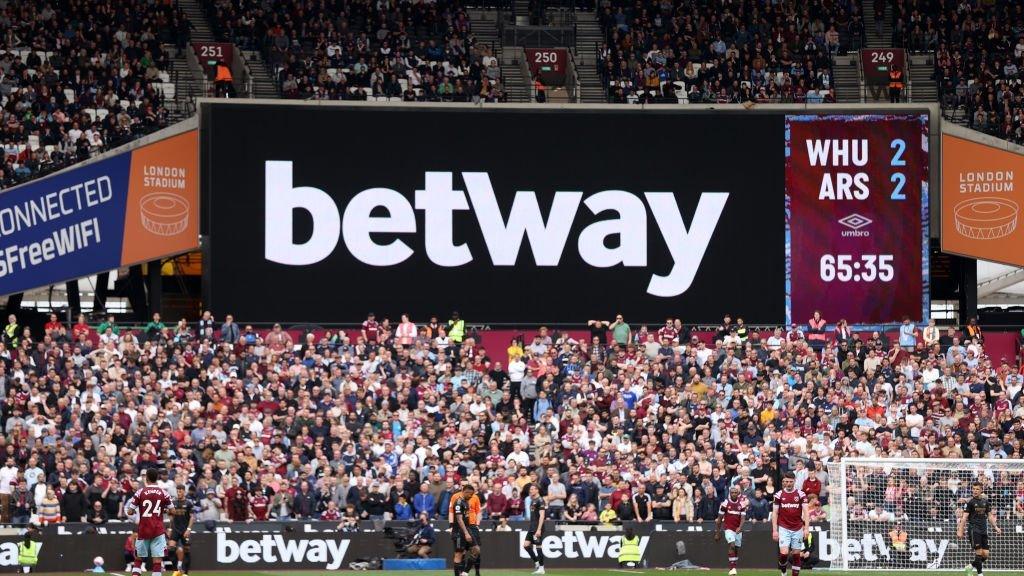29,000 gambling ads in Premier League weekend, says research

West Ham's match against Aston Villa contained close to 6,500 gambling messages, the researchers found
- Published
The number of betting adverts during the opening weekend of the Premier League season almost trebled compared to last year, new research says.
Researchers analysed Premier League coverage in the UK across TV - including pitchside hoardings and shirt logos - as well as radio and social media.
They counted more than 29,000 gambling messages, a 165% increase on the opening weekend a year ago.
West Ham's match against Aston Villa contained close to 6,500 gambling messages - about 30 every minute.
The authors of the report - the University of Bristol business school, funded by a grant from the charity Gamble Aware - has called the industry's attempt to self-regulate "wholly inadequate and tokenistic".
They say their report shows fans and children are being put at risk because they are being exposed to gambling advertising.
The Betting and Gaming Council, which represents the gambling industry, criticised the research, saying it "fundamentally misunderstands both advertising, and the way in which it is strictly regulated".
But Peter Shilton, England's most capped male footballer and a former gambling addict, told the BBC the gambling industry is "out of control and can't regulate itself", and called for government action.
"Just a few months ago, a new code of conduct was published by the industry, external to curb marketing during football events, but the policy has had no impact on the volume whatsoever," said co-lead author Dr Raffaello Rossi.
"It’s clear that the industry's attempt to self-regulate is wholly inadequate and tokenistic. Despite having had years to put in place effective measures to protect consumers, the gambling industry continues to prioritise profit over safety."
The Premier League is working with its clubs on the implementation of the Code of Conduct for Gambling Related Agreements in Football, which was introduced at the start of this season.
Its clubs are required to adhere to all legal and regulatory requirements, via the Gambling Commission and the Advertising Standards Authority.
Former England goalkeeper Shilton, 75, had a gambling addiction for 45 years until seeking help about 10 years ago.
He says the new research "just shows [the gambling industry is] out of control". He added: "They can't regulate themselves, and it doesn't look as though anybody else is bothering to regulate them. It's another year gone by when you know it's got worse.
"We managed to get a start with the Premier League banning [sponsorship] on the front of shirts, but that was only just a small part of it.
"It's time now that the government step in and do something about it because it's been going on for so long now."
A government spokesperson said: "We recognise the impact harmful gambling can have on individuals and their families and are absolutely committed to strengthening protections for those at risk.
"Ministers are currently considering the full range of gambling policy, including on advertising and sponsorship, and will update in due course."
Last year, the Premier League clubs collectively agreed to withdraw gambling sponsorship from the front of clubs’ matchday shirts, starting from the end of the 2025-26 season.
How has the gambling industry responded?
The Betting and Gaming Council responded by saying that its members "take a zero tolerance approach to betting by children" and have introduced new age gating rules.
It adds that they commit 20% of TV, radio and digital advertising to safer gambling messaging, and provide funding to the UK's most popular sports, including £40m each year to the English Football League.
A BGC spokesperson said: "This research fundamentally misunderstands both advertising, and the way in which it is strictly regulated, while making a series of statements which are either misleading or incorrect.
“Betting advertising and sponsorship must comply with strict guidelines and safer gambling tools and signposts to help for those concerned about their betting, are regularly and prominently displayed."
Related topics
- Published21 December 2023

- Published16 August
